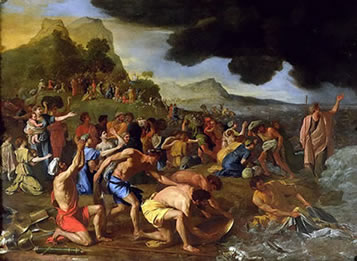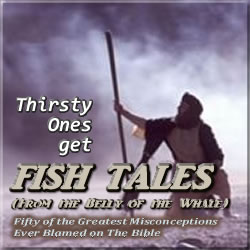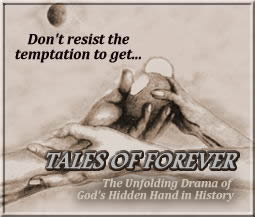These Dust-like Descendants
A Place for My People Israel
In connecting the history of the Stone Kingdom, Israel of old, and America, we need to address several questions in relation to the various ingredients I’ve already mentioned: First, is our current understanding of “the number of the Children of Israel” adequate to this task? Second, if it isn’t, as I’m contending, how do we overhaul this flawed view to arrive at a correct numbering of Israel? Third, if Scripture is our source for answers, as it should be, then where do we find these Children of Israel, of which The Bible speaks? Fourth, to which nation, described as “not a people” and “without understanding,” is Moses referring, by which God intends to make Israel of old jealous and angry? Fifth, when God spoke of avenging His children and cleansing His land, where might this take place and on behalf of which people? Sixth, is it possible that this nation “without understanding,” which Moses described, has any connection with the Kingdom of Stone that Daniel foresaw? And seventh, if there is a connection, then how does this tie into God’s plan that the Earth is not to be abandoned but, rather—as Jesus taught us to pray—transformed prior to the advent of the New Earth?
As for our first question, whether our current understanding of the number of the Children of Israel is up to this task, let’s be clear: While most Christians insist these Israelites comprise the modern Jewish state that was, in 1948, re-established in their ancient homeland of Palestine, this view is dashed to pieces when we look to The Bible. Within its pages, we come face to face with yet another of those paradoxical truths we constantly confront when investigating all things biblical. That’s because it involves one of the most famous promises of God in Scripture, one that most Christians and Jews alike are aware of, yet without their ever coming to grips with the obvious implications of that promise. And it goes as follows.
While Abram and Sarai journeyed as strangers and pilgrims through the land of Canaan, God, the Outsider, spoke to Abram, the outsider:
Look all around you, Abram, to the north and south, to the east and west. All the land that you see, I will give to you and your offspring forever. I’ll make your offspring like the dust of the Earth, so if anyone can count the dust, then your offspring can be counted. Go, walk the length and breadth of the land, because I’m giving it to you.1
Here we encounter the first of God’s promises to Abram regarding the number of his promised descendants, which were to one day be as numerous as the dust of the Earth. Without trying too hard to compute such a number, presently, please reserve this idea firmly in your mind as we proceed.
Story Continues Below
Says Richard Price—the founder and CEO of Academia.edu—on his podcast In Depth With Academia:
On Earth as It is On Heaven: The Promise of America, Technology, and the New Earth is:
To hear Price’s book review of On Earth as It is On Heaven, CLICK HERE.
To hear Kent discuss the promises of God that pertain to God’s Kingdom on Earth, particularly as they pertain to the nations of the West, with Zen Garcia, the host of the Internet talk show Momentary Zen, CLICK BELOW.
Story Continues From Above
Of course, from a purely human perspective, the notion that Abram would become the father of many nations seemed ludicrous to say the least. That’s because some twenty-five years after God first promised Abram concerning these dust-like descendants, Abram’s wife was still childless. Never mind that Sarai had concocted her own scheme to help God keep His promises to Abram. Never mind that in fixing up her husband with her handmaiden Hagar, the union produced Abram’s first child by the name of Ishmael. Never mind that Ishmael was also destined to father a great nation of his own. Because despite all of Sarai’s well-intentioned efforts, nothing she did added to God’s promises, which pertained exclusively to Abram’s offspring through her.
When Abram was ninety-nine years old, the Lord appeared to him and said, “I am God Almighty; walk before Me faithfully and sincerely. Then I’ll make My covenant between Me and you, and I’ll greatly increase your numbers.”
Abram fell face-down, and God said to him, “As for Me, this is My covenant with you: You’ll be the father of many nations. No longer will you be called Abram; your name will be Abraham, because I’ve made you a father of many nations. I’ll make you very fruitful; I’ll make nations of you, and kings will come from you. I’ll establish My covenant as an everlasting covenant between Me and you and your descendants for generations to come, to be your God and the God of your descendants. The whole land of Canaan, where you now reside as a foreigner, I’ll give as an everlasting possession to you and your descendants after you; and I’ll be their God…”
God also said to Abraham, “As for Sarai your wife, you’re no longer to call her Sarai; her name will be Sarah, because I’ll bless her and will certainly give you a son by her. I’ll bless her so that she’ll be the mother of nations; kings of peoples will come from her.”2
Here we’re faced with a troubling inconsistency, though not so much an inconsistency as another paradox.
As for the inconsistent aspect, in looking at these promises, what we find is that in the space of just these two passages in Genesis, we have God promising that Abraham will be the father of dust-like descendants, many nations, and kings of peoples. Yet ask the typical believer of Scripture if they honestly believe that God meant what He said here, and even they might blush with embarrassment as they try in vain to convince you the modern-day Jewish people have fulfilled these promises. Can the number of the people of the modern Jewish state be compared to dust? Is the modern Jewish state comprised of many nations? And is the modern Jewish state presided over by a king born of Abraham and Sarah? Of course, all of these are rhetorical questions, all of which elicit a response of: “No, no, and no.” That said, then, the Jewish people inhabiting modern-day Palestine can’t possibly be those spoken of as “the number of the Children of Israel.”
What’s more, if the promises to Abraham, concerning these descendants, nations, and kings weren’t fulfilled by the modern Jewish state, then how do we respond to the accusation that God is therefore a liar, a fraud, or incapable of keeping His promises? Certainly this is what Thomas Paine, that most excellent author of the American Revolution, concluded when he looked at these same circumstances. In fact, this inconsistency so disturbed Paine that although he began his career writing Common Sense, which did so much to inspire Colonial America in its revolutionary effort, he became disillusioned by God’s apparent failure to keep His word to the Israelites and fell headlong into agnosticism. So much so that Paine went on to pen the most pessimistic of all revolutionary works, The Age of Reason, which had more to do with the “Enlightenment” thinking that produced France’s failed attempt at duplicating the American Revolution. Far from creating a “more perfect union” in post-Revolutionary France, such cynicism instead produced The Reign of Terror.








